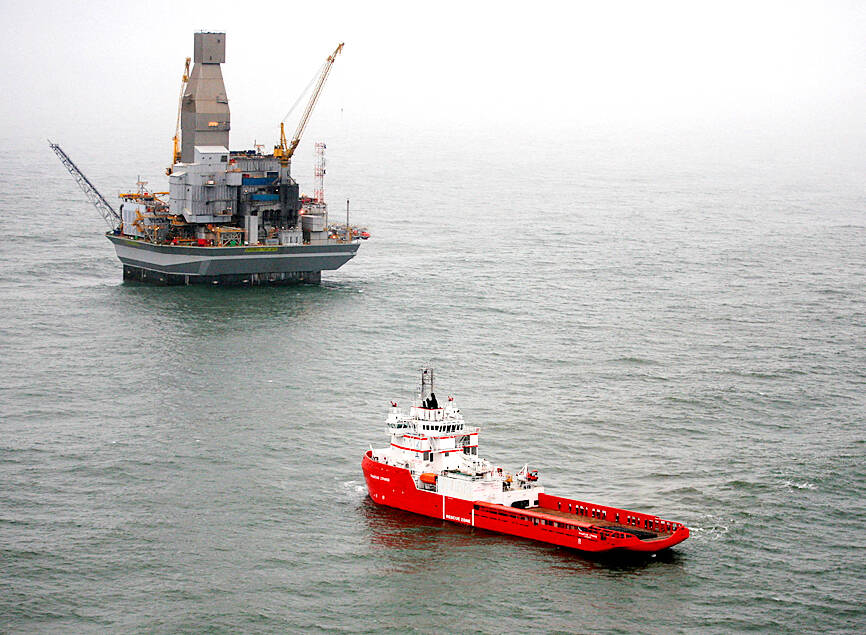Major oil-producing countries led by Saudi Arabia and Russia looked set to maintain their current output levels at a meeting yesterday, ahead of fresh sanctions against Moscow coming into force.
OPEC, which represents 13 of the world’s top oil-producing nations, was due to consult with 10 other oil producers, including Russia, to review their decision in October to cut production by 2 million barrels per day.
The OPEC+ videoconference was to take place after press time last night.

Photo: Reuters
On Friday, the EU, G7 and Australia agreed a US$60-per-barrel price cap on Russian oil, which is to come into effect today or soon after, alongside an EU embargo on maritime deliveries of Russian crude oil.
The measure seeks to prevent seaborne shipments of Russian oil to the EU, which account for two-thirds of the bloc’s oil imports from Russia, an attempt to deprive Moscow’s war chest of billions of euros.
While Russia on Saturday denounced the incoming price cap, threatening to suspend deliveries to any country that adopted the measure, Ukraine said the cap should have been set even lower.
For OPEC+, the big unknown in the oil equation is how heavily sanctions will hit Russian supply.
“The uncertainty for Russian supply is significant,” DNB analysts said.
OPEC would therefore “aim for a low-profile meeting that leaves existing production quotas unchanged,” they said.
Moscow’s threat to suspend deliveries to countries abiding by the price cap would put “some in a very uncomfortable position,” Oanda Corp analyst Craig Erlam said. “Choosing between losing access to cheap Russian crude or facing G7 sanctions.”
The choice of a virtual OPEC+ meeting instead of an in-person conference at the Vienna headquarters indicated a policy rollover, UniCredit SpA analyst Edward Moya said.
However, “deeper oil output cuts” could still not be ruled out at this stage, Moya added.
Amid economic gloom fueled by soaring inflation and fears of China’s weaker energy demand due to its COVID-19-related restrictions, the two global crude benchmarks remained close to their lowest level of the year, far from peaks in March.
Since the group’s previous meeting in early October, Brent crude and West Texas Intermediate have lost more than 6 percent of their value.
However, speculation that a further OPEC+ production cut might still be on the table boosted prices throughout the week.
“OPEC+ might feel compelled to adopt a more aggressive stance” by cutting or threatening to cut production even further, UniCredit analyst Edoardo Campanella said. “Russia might also retaliate by leveraging its influence within OPEC+ to push for more production cuts down the road, thus exacerbating the global energy crisis.”

NOT JUSTIFIED: The bank’s governor said there would only be a rate cut if inflation falls below 1.5% and economic conditions deteriorate, which have not been detected The central bank yesterday kept its key interest rates unchanged for a fifth consecutive quarter, aligning with market expectations, while slightly lowering its inflation outlook amid signs of cooling price pressures. The move came after the US Federal Reserve held rates steady overnight, despite pressure from US President Donald Trump to cut borrowing costs. Central bank board members unanimously voted to maintain the discount rate at 2 percent, the secured loan rate at 2.375 percent and the overnight lending rate at 4.25 percent. “We consider the policy decision appropriate, although it suggests tightening leaning after factoring in slackening inflation and stable GDP growth,”

DIVIDED VIEWS: Although the Fed agreed on holding rates steady, some officials see no rate cuts for this year, while 10 policymakers foresee two or more cuts There are a lot of unknowns about the outlook for the economy and interest rates, but US Federal Reserve Chair Jerome Powell signaled at least one thing seems certain: Higher prices are coming. Fed policymakers voted unanimously to hold interest rates steady at a range of 4.25 percent to 4.50 percent for a fourth straight meeting on Wednesday, as they await clarity on whether tariffs would leave a one-time or more lasting mark on inflation. Powell said it is still unclear how much of the bill would fall on the shoulders of consumers, but he expects to learn more about tariffs

Greek tourism student Katerina quit within a month of starting work at a five-star hotel in Halkidiki, one of the country’s top destinations, because she said conditions were so dire. Beyond the bad pay, the 22-year-old said that her working and living conditions were “miserable and unacceptable.” Millions holiday in Greece every year, but its vital tourism industry is finding it harder and harder to recruit Greeks to look after them. “I was asked to work in any department of the hotel where there was a need, from service to cleaning,” said Katerina, a tourism and marketing student, who would

i Gasoline and diesel prices at fuel stations are this week to rise NT$0.1 per liter, as tensions in the Middle East pushed crude oil prices higher last week, CPC Corp, Taiwan (台灣中油) and Formosa Petrochemical Corp (台塑石化) said yesterday. International crude oil prices last week rose for the third consecutive week due to an escalating conflict between Israel and Iran, as the market is concerned that the situation in the Middle East might affect crude oil supply, CPC and Formosa said in separate statements. Front-month Brent crude oil futures — the international oil benchmark — rose 3.75 percent to settle at US$77.01